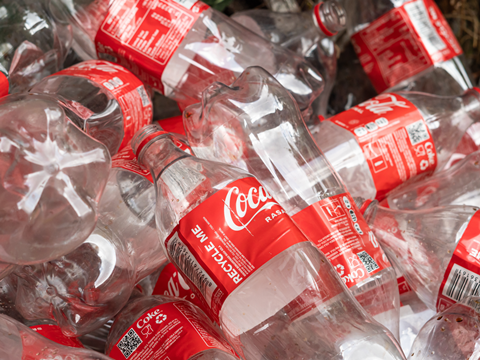
Coca-Cola says it will revisit ‘100% recycled’ and ‘100% recyclable’ claims on its plastic bottles after a legal complaint accused them of ‘misleading’ consumers about the pack’s recycled content.
In November 2023, the European Consumer Organisation (BEUC) and its members raised a complaint to the European Commission and its Consumer Protection Cooperation Network (CPC). In their view, Coca-Cola, Nestlé, and Danone were infringing consumer protection law by using statements like ‘100% recycled’ and ‘100% recyclable’ on their plastic beverage bottles.
It was argued that these statements only applied to certain components of the bottle; not to the caps, inks, colourants, or adhesives, for example, which were believed to impact the actual recycled content of a bottle but were ‘rarely, if ever’ mentioned on labels.
Rosa Pritchard, plastics lawyer at ClientEarth, said at the time: “The evidence is clear – plastic water bottles are simply not recycled again and again to become new bottles in Europe. A ‘100%’ recycling rate for bottles is technically not possible and, just because bottles are made with recycled plastic, does not mean they don’t harm people and planet.
“Of course, where waste can be recycled, consumers should keep up their good work. Recycling is less harmful than other disposal methods, such as incineration or landfill. But it is important companies don’t portray recycling as a silver bullet to the plastic crisis – instead they need to focus efforts on reducing plastic at source.”
After voluntarily entering into a dialogue with the CPC, Coca-Cola now intends to revise its product labels and marketing materials – including its use of ‘green’ imagery and symbols – to avoid misleading consumers.
ClientEarth explains that national consumer protection authorities will monitor the roll-out of the revised bottles, as well as assess the practices of other major bottling companies on the EU Single Market.
“This news sends a clear signal to the entire industry confirming that misleading claims about recycling can pose a legal risk,” commented Kamila Drzewicka, senior lawyer at ClientEarth. “In our view, this outcome should be seen as the floor, not the ceiling—regulators and courts across the EU now have a clear mandate to take action against such practices, which mislead consumers and breach legal standards.
“Recycling cannot catch up with the massive volume of plastic produced. Companies are in a unique position to change how we consume, but these misleading claims are making it hard for consumers to make good environmental choices.”
Agustín Reyna, director general of BEUC, added: “It is good news that Coca-Cola has heeded consumers’ call and commits to clarify that its ‘100%’ recycling claims only apply to parts of the bottle. However, if it’s written in small print, the ‘100%’ figure will undoubtedly stick on consumers’ minds and keep giving the impression that it’s harmless to keep buying plastic bottles.”
This development comes after Danone settled a lawsuit filed by ClientEarth, Surfrider Foundation Europe and Zero Waste France regarding its alleged violation of French duty of vigilance law. As part of the agreement, the corporation must now publish its use of plastics, strengthen its plastics prevention policy, and attend annual meetings in the coming years.
Another lawsuit from Hagens Berman accuses Procter & Gamble of making misleading environmental claims on its Charmin toilet paper – ranging from the use of ‘hazy’ FSC and Rainforest Alliance certifications, such as an ‘altered but nearly identical’ seal, to hiding its alleged creation of so-called ‘Frankenforests’ during its replanting operations.
In a separate investigation, the United Nations has expressed concerns after Coca-Cola Europacific Partners chose to replace reusable glass bottles with single-use plastic alternatives in the small island developing state of Samoa. Due to a lack of local recycling infrastructure, the island is feared to have experienced an ‘immediate increase’ in plastic litter and pollution, thus driving up management costs and export-related emissions.
If you liked this story, you might also enjoy:
The ultimate guide to the Packaging and Packaging Waste Regulation in 2025
How are the top brands progressing on packaging sustainability?
Everything you need to know about global packaging sustainability regulation in 2025
The key to increasing the use of reusable packaging in supermarkets













No comments yet